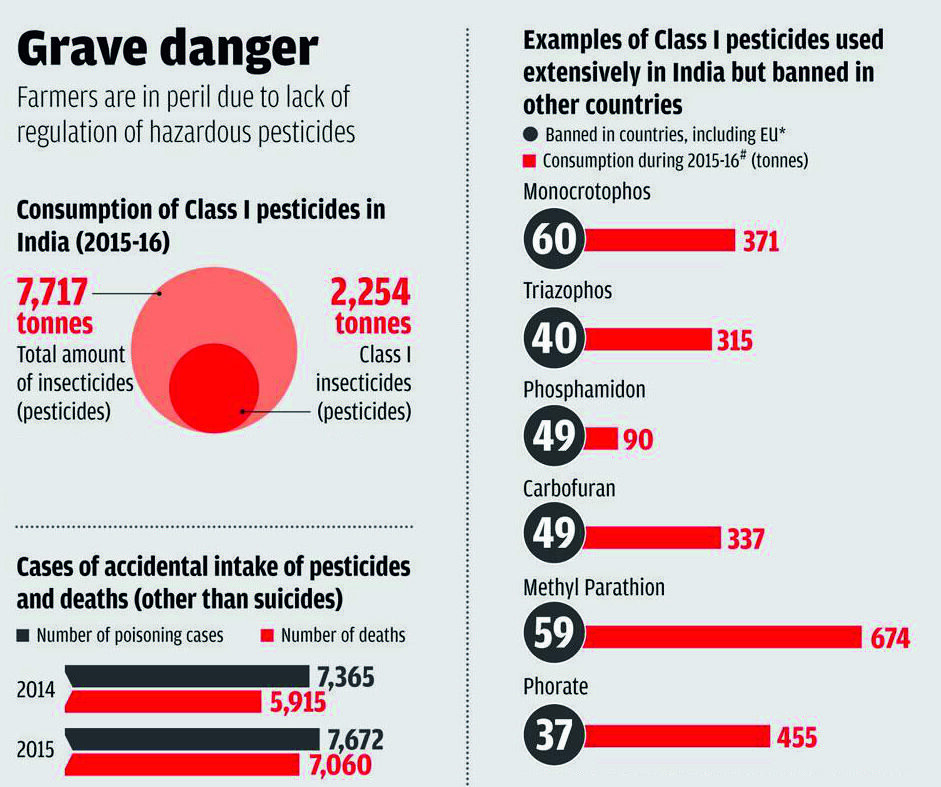Biodiversity & Environment
Pesticide Ban
- 10 May 2019
- 4 min read
California is banning a widely used pesticide that has been linked to brain damage in children. The state ban on Chlorpyrifos, a pesticide used on almonds, citrus, cotton, grapes, walnuts and other crops, follows years of research finding the chemical causes serious health effects in children, including impaired brain and neurological development.
Status of pesticide ban in India
- With the increasing number of farmer deaths due to pesticide poisoning and submission of Anupam Verma Committee report the Union Ministry of Agriculture and Farmers Welfare had notified Pesticides (Prohibition) Order, 2018 under which use of 18 pesticides was banned.
- Of these 18, 12 pesticides have been banned from immediate effect (from August 9, 2018) and ban on another six will be implemented from December 31, 2020. The ban applies to registration, import, manufacture, formulation, transport, sale and use of all these pesticides.
Why class 1 pesticide should be banned India?
- Pesticides whose handling and application require the use of personal protective equipment that is uncomfortable, expensive or not readily available should be avoided, especially in the case of small-scale users and farm workers in hot climates.
- It is impossible to ensure use of personal protective equipment by small-scale farmers and farm workers in India.
Other reasons
- Every year, there are about 10,000 reported cases of pesticide poisoning in India.
- Lack of awareness, no initiative by govt agriculture depart to teach how to use pesticide.
- Unapproved use of pesticides—spraying a particular pesticide on a crop for which it is not allowed— continues to be a big problem in the country.
How pesticide can impact humans?
- Endocrine disruptors: The term endocrine disruptor refers to substances that interfere with hormones and hormone balance.
- Hormones are the chemical messengers of the body. They are necessary to regulate different functions, in particular growth and reproductive functions.
- The endocrine effects can be activated by very low concentrations of chemicals. They can manifest as:
- reduced semen quality with consequent decreased fertility, genital malformations, testicular and prostate cancer
- early puberty, appearance of cysts in the ovaries, uterus anomalies, breast cancer, pregnancy complications with early abortions, decreased fertility
- diabetes and obesity
- neurological disorders, especially disorders in brain development, and degenerative diseases in the brain, such as Parkinson’s disease
- hyper and hypo thyroidism and thyroid tumours.
Acute toxicity
Pesticides can be acutely toxic. This means that they can cause harmful or lethal effects after one single episode of ingestion, inhalation or skin contact. The symptoms are evident shortly after exposure or can arise within 48 hours. They can present as:
- respiratory tract irritation, sore throat and/or cough
- allergic sensitisation
- eye and skin irritation
- nausea, vomiting, diarrhoea
- headache, loss of consciousness
- extreme weakness, seizures and/or death
Long term (or chronic) toxicity
- Pesticides can cause harmful effects over an extended period, usually following repeated or continuous exposure at low levels. Low doses don’t always cause immediate effects, but over time, they can cause very serious illnesses.
- Long term pesticide exposure has been linked to the development of Parkinson’s disease; asthma; depression and anxiety; cancer, including leukaemia and non-Hodgkin lymphoma; and attention deficit and hyperactivity disorder (ADHD).





